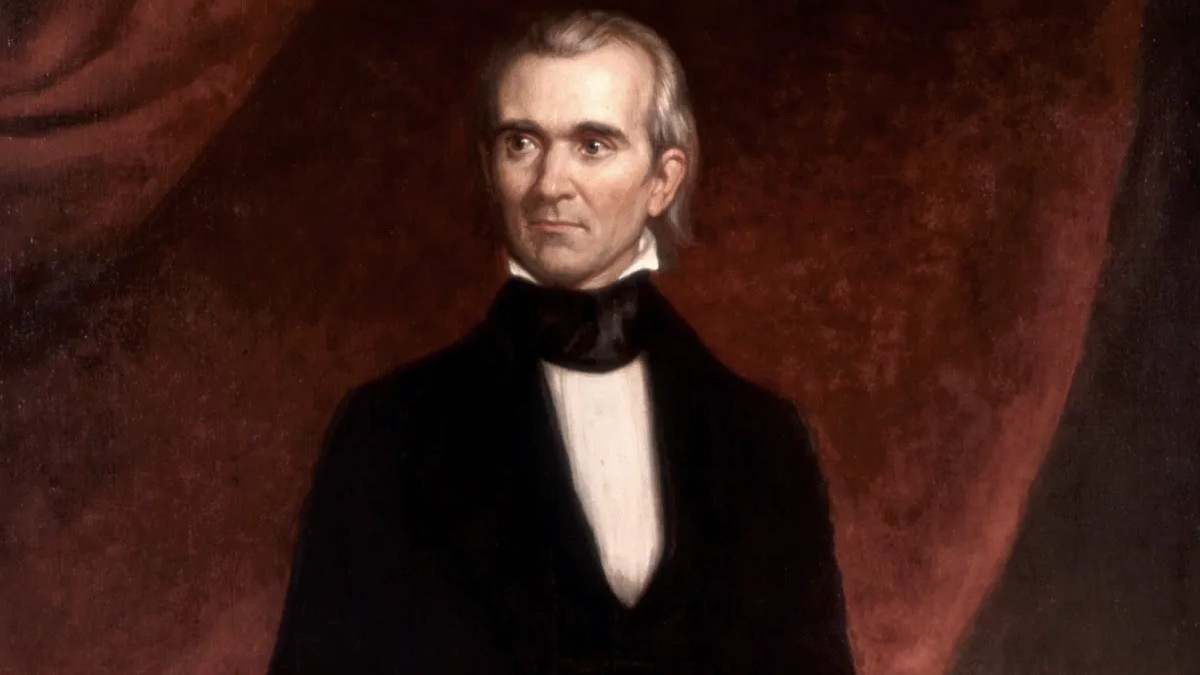Editor’s Note: This profile is part of a series taking a closer look at US presidents ahead of the 2024 presidential election between Donald Trump and Kamala Harris.
James K Polk was one of America’s most expansionist presidents.
The country grew over 2.5 million square kilometres under Polk’s auspices.
While he did not coin the term ‘Manifest Destiny’ – a concept which propagated American expansion across the continent – Polk certainly pursued it with vim and vigour.
Let’s take a closer look at the 11th President of the United States.
Early years
Polk was born on November 2, 1795, in North Carolina’s Mecklenburg County.
His parents were Samuel and Jane Knox Polk. Polk’s father Samuel was a respected leader of the community, a judge and a businessman. He also owned slaves and moved the family to Tennessee.
Polk was a frail, sickly boy. He would later describe himself as “the meager boy, with pallid cheeks, oppressed and worn with disease.”
Though his ill health during his childhood meant he never had any formal schooling, Polk managed to clear an entrance exam into a university in North Carolina. By the time he graduated, Polk known to be fluent in both mathematics and the Greek classics.
He was his class’s Latin salutatorian – the student who delivers a Latin oration at a university graduation ceremony.
Polk returned to Tennessee in 1818 where he began practicing law.
Impact Shorts
More ShortsPolitics
In 1823, at age 27, Polk was elected to the state House of Representatives.
It was here that he met ‘Old Hickory’ Andrew Jackson – of whom he became a friend and devoted follower – so much so that Polk would be renamed ‘Young Hickory’
He also married Sarah Childress on January 1, 1824, whose social standing as the daughter of a planter would come exceedingly in handy in the political sphere.
In 1825, Polk would successfully run for the US House of Representatives as a stalwart Democrat.
Polk would spend the next decade and a half in the House – the last few years as Speaker where he used his powers to ban any discussion on slavery.
Polk in 1839 left the US House after being elected Governor of Tennessee.
Polk as governor worked on banks and education. Though he ran for re-election twice, he lost and returned to Washington.
With presidential contenders such as Martin Van Buren, Lewis Cass, and James Buchanan in the fray in 1844, Polk was aiming for the vice-presidential nomination of the Democratic Party.
But the Democrats were deadlocked over the annexation of Texas – which had separated from Mexico in 1836.
When Martin Van Buren, the presumptive nominee, came out against the platform of annexation, it created an opening for Polk.
Now, Jackson, also a fellow believer in “Manifest Destiny”, threw his support behind ‘Young Hickory.’
After eight votes produced no result, Polk won after his name was added in the ninth round of balloting.
Polk was now officially a ‘dark horse’ candidate for president – the first in US history.
His opponent would be Henry Clay of the Whig Party.
The Whigs sought to pounce on Polk’s lack of profile outside political circles.
“Who is James K Polk?” they would ask at every opportunity.
The answer came soon enough – Polk defeated Clay and became the next President of the United States.
Time in office
Polk, the youngest president ever, entered office full of energy.
As president, he had several major accomplishments including annexing Texas, successfully concluding a peace treaty with Great Britain and claiming Oregon, conducting a war with Mexico and acquiring California and New Mexico.
He also reduced tariffs, set up an independent Federal Treasury and propagated the Monroe Doctrine.
Polk, who pledged to serve just one term as president if elected, followed through.
By the time he left office, he was thoroughly exhausted and worn down by the burdens of being president.
Sadly, Polk died of cholera just months after returning to Tennessee in March 1849.
Legacy
There is little doubt that Polk accomplished a great many things during his time in office.
The US under Polk grew massively in size and Polk firmly established the powers of the executive.
On slavery, the issue of the time that would tear the country apart, Polk in fact publicly called for the practice to be spread into the new territories that joined the union
While historians do not rank him as an excellent president, there is no denying that he certainly is an important one.
)